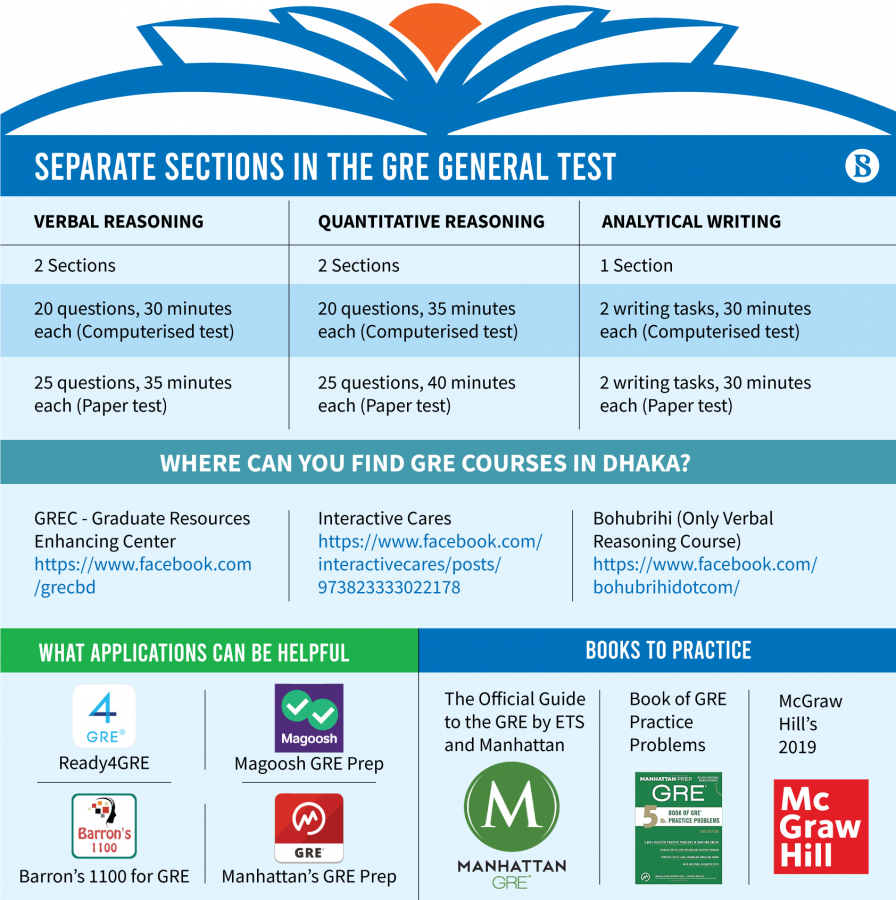How to ace the GRE
How to ace the GRE

Each individual functions in a different way. Therefore, everyone should tailor their preparation in a way that best suits their own style
Sourodip Paul is a Bangladeshi ex-pat student. He is currently pursuing his Masters in Economics at the Australian National University. Earlier in 2018, when he was in his undergraduate final year, he sat for the GRE and bagged a 330 out of 340.
Despite studying in Business Administration at the undergraduate level, he sought to study Economics during the post-graduation phase of his education. So, he sat for the GRE and now he is living his dream in Australia.
“If you want to apply for Masters anywhere in the world, you will need to sit for the GREs. The US universities almost certainly require it but even for universities that do not require it, it is a great addition to your CV,” Sourodip said. Sourodip represents a large chunk of Bangladeshi graduates who are looking forward to pursuing higher studies abroad. The writer is not any different.
In fact, every Bangladeshi student, sometimes in their career, aspires to go abroad to get a professional Master’s degree or a PhD. We all want to walk amongst the best of the academicians and to learn from the greatest, brightest minds of our time.
The Graduate Records Examinations, more commonly known as the GRE can help you move one step further in achieving that goal.
What is the GRE?
Created and administered by the Educational Testing Service (ETS), the GRE General Test is a standardised test for graduates aspiring to pursue masters or doctoral degrees. The test is designed to evaluate the overall preparedness of students for grad schools.
Some graduate programmes, particularly in North America, require applicants to take the GRE General Test, with some even requiring the GRE Subject Tests that focus on a specific discipline like Biology, English literature, Physics, Mathematics etc.
The General Test is quite similar to the SATs in that it also evaluates your analytical and reasoning skills to assess whether you are prepared for advanced studies. The questions are generally set on mathematics, reading and writing. The following infographic briefly presents the separate sections in the GRE General Test.

Why should you take the GRE?
Firstly, it is because you have to. Most universities in the US as well as a number of universities in the other continents require a GRE score for admission into their masters or doctoral programmes. Although most European universities do not require a GRE score, a good GRE score can always boost your chances of getting in.
But more importantly, for most of us belonging to not-so-privileged families, bearing the expenses for further studies may often be far beyond our capabilities. A respectable GRE score can help you get a scholarship at your desired university. It can inform the professors about your mental aptitude as well as preparedness to adapt to advanced studies.
How difficult is it?
Most people often caution against the utmost difficulties faced during the preparation for the GRE. Some say that even after all the effort you put in, you may not get a score good enough for scholarships. As a result, we automatically assume that it is somewhat impossible to pull off and eventually, we give up on our dreams or half-baked our attempts to do well in the exams.
But does all of this fear-mongering bear any truth?
“Well, it is hard to place the difficulty level of an aptitude test because it is very different to different people,” Sourodip said when asked about the difficulty of the GRE. “The GRE can be difficult in either verbal or quantitative or analytical writing segments or all of them depending on your previous skill levels. However, it is possible to prepare and get better in all the sections.”
How can you ace the GRE?
Now that you are determined to do well in your GRE, you need to know how to do it. Each individual functions in a different way. Therefore, everyone should tailor their preparation in a way that best suits their own style.
However, some general guidelines can always be of assistance. We asked Sourodip to provide a general guideline for our readers and aspirants.
Sourodip said, “The most important thing in preparing for the GRE is practice. It is important to do as many practice problems and mock tests as possible so that you are familiarised with the exam method before taking the actual one. While theoretical prep is also necessary, more emphasis should be put on practice. To practice, one can take the help of GRE books, online resources etc.”
Yes, practice makes a man perfect. Duh! Who didn’t know that right?
But which books should you read from amongst the hundreds of books available in the market? How should you prepare yourself for the quantitative sections or the verbal sections?
We asked the same question to Sourodip and he had a lot to say.
“My suggestion would be to mainly use two books: The Official Guide to the GRE by ETS and Manhattan Prep’s 5lb. Book of GRE Practice Problems. The official guide has questions resembling the actual ones and the Manhattan one has a lot of variety.”
Sourodip added, “These two books do not directly clarify or teach concepts but rather through giving you the solution to problems that you can’t solve or make an error in. If you need concept clarifications then I’d suggest going to YouTube but if you prefer a book then McGraw Hill’s 2019 book should have it.”
One of the major challenges faced by most GRE examinees is the language barrier. When asked about preparing for the verbal reasoning section, Sourodip said, “I was also struggling a bit with the vocabulary and reading comprehensions. So, I used the Magoosh GRE Vocab app to quiz myself and learn by mistakes.”
As suggested by Sourodip, the readers can also go through Barron’s Essential Word for the GRE or the Word Smart by Princeton Review to enrich their vocabulary.


